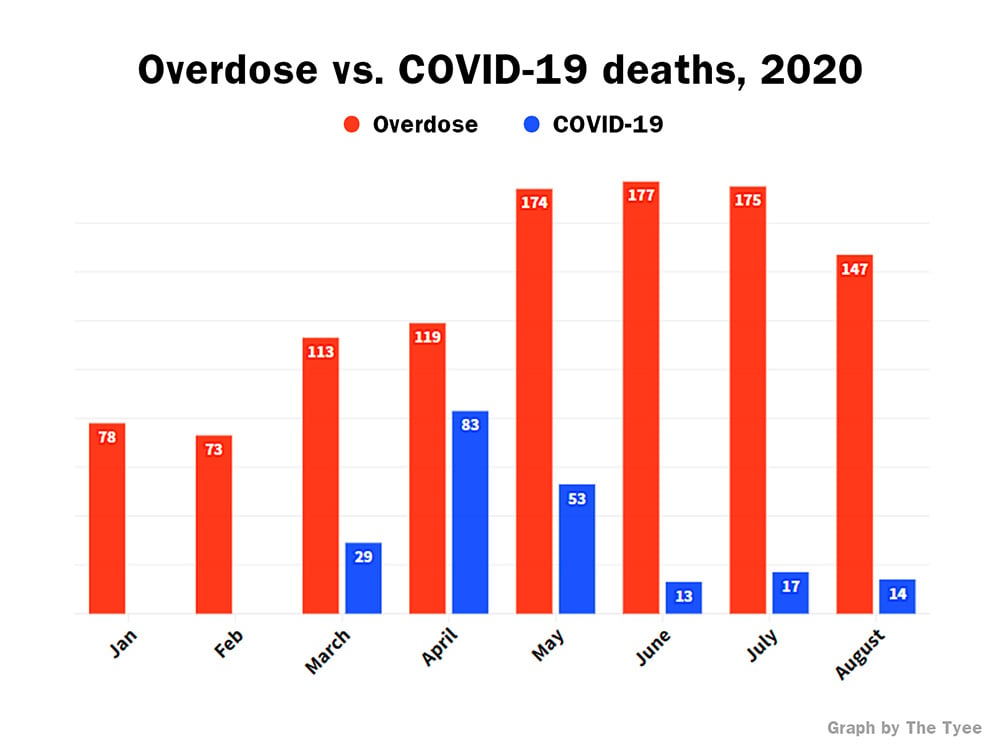It has taken just eight months for illicit drug overdose deaths in 2020 to surpass the 983 fatalities in all of 2019.
There were another 147 overdose deaths in August — the equivalent of about 4.7 people dying each day — bringing 2020’s total so far to 1,068 deaths, the BC Coroners Service reported today. Since January 2016, at least 6,083 people have died of overdoses in the province.
While August’s figure is a slight 16 per cent decrease compared to July’s 176 deaths, it marks a 71 per cent increase compared to August 2019’s 86 deaths.
Emergency services also responded to nearly 7,500 non-fatal overdose calls this summer, making it the highest number of overdose calls in any three-month period.
These devastating milestones come on the heels of a massive push in B.C. to expand safer supply — prescribing pharmaceutical alternatives to the street drug supply — in an effort to separate people from the increasingly toxic illicit drug supply.
Illicit fentanyl, a potent synthetic opioid, was present in 79 per cent of deaths this year. Fourteen per cent of cases between April and August involved extreme fentanyl concentrations, nearly double the rate in 2019 through to March 2020.
“Death can be the consequence of any kind of drug use now,” said Downtown Eastside community advocate Karen Ward. “It doesn’t matter if you’re out with buddies or have been using for 20 years.”
Pandemic-related supply chain disruptions and increased social isolation are driving factors in the surge of deaths, which led the province to enact guidelines to expand safer supply efforts for people at risk of both COVID-19 and overdose in March.
But after that, the province saw a record-breaking six consecutive months of more than 100 deaths reported. June was the deadliest month in the province’s history, with 181 deaths attributed to illicit drug overdoses.
Just last week, bolder measures were announced in recognition that simply accessing the illicit drug supply now is potentially fatal, regardless of COVID-19 exposure risk.
Provincial health officer Dr. Bonnie Henry issued an order to expand prescribing powers to registered nurses and registered psychiatric nurses, who join physicians and some pharmacists as eligible prescribers.
“In view of the worsening situation of overdose deaths arising from the dual public health emergencies, it is necessary and in the public interest to increase access to health professionals who can prescribe pharmaceutical alternatives to the toxic drug supply,” Henry wrote in the order.
A yet-to-be released policy directive from the province will also see eligibility expanded to nearly all who access the street drug supply even intermittently, and more community pharmacies will become access and dispensation sites.
But with the election looming and the legislature dissolved, when the policy will be finalized remains to be seen. And as the wait continues, people who use drugs across the province are still at great risk.
About 60 per cent of deaths took place in the Vancouver Coastal Health and Fraser Health regions, but the Northern Health region had the highest rate of deaths at 40 per 100,000 residents.
Numbers in the north have increased the last few months, while rates in Vancouver and Interior regions declined in August. ![]()
Read more: Health, Rights + Justice, BC Politics
















Tyee Commenting Guidelines
Comments that violate guidelines risk being deleted, and violations may result in a temporary or permanent user ban. Maintain the spirit of good conversation to stay in the discussion.
*Please note The Tyee is not a forum for spreading misinformation about COVID-19, denying its existence or minimizing its risk to public health.
Do:
Do not: